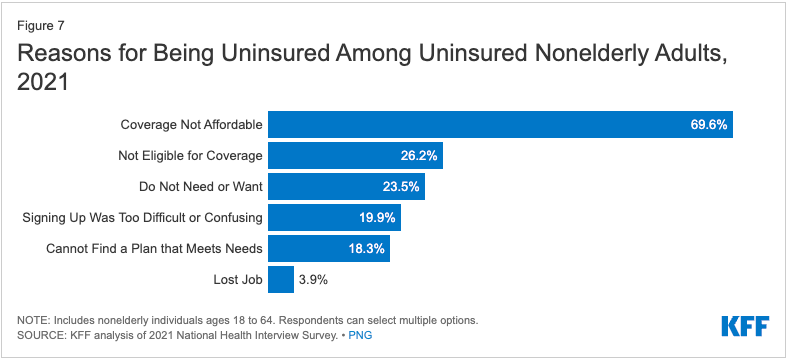Best Healthcare Options for Uninsured Individuals
HeartBit Newsletter #4
Are you like Casey?
She’s a 32-year-old freelance writer. She is uninsured for several years due to the high cost of coverage. She can’t afford the premiums and didn't qualify for financial assistance. Casey lives with constant anxiety about potential health issues and the financial burden they can bring.
According to a report by the Kaiser Family Foundation, approximately half of U.S. adults struggle to afford healthcare costs. Nearly 40% of U.S. adults have delayed or gone without medical care in the past year due to cost. By postponing necessary care, you are more likely to accumulate medical bills in the future. Uninsured adults who skip preventive care for major health conditions and chronic diseases are at an increased risk of hospitalization for avoidable health problems and experience overall declines in health.

So what are some solutions?
Explore your options and consider alternative coverage plans, such as short-term or catastrophic coverage, that may be more affordable for your budget.
- Short-term health insurance plans provide temporary coverage for a limited period, typically up to 12 months. These plans are designed to bridge gaps in coverage and may offer more affordable premiums compared to traditional health insurance plans. However, it's important to note that short-term plans may have limited coverage and may not cover pre-existing conditions.
- Catastrophic health insurance plans are available to individuals under the age of 30 or those who qualify for a hardship exemption. These plans offer coverage for major medical expenses, such as hospitalizations and emergency care, but have higher deductibles and lower premiums compared to traditional plans. Catastrophic plans can be a more affordable option for individuals who are generally healthy and do not require frequent medical care.Investigate state-specific programs, community health clinics, or nonprofit organizations that offer low-cost or free healthcare services. These resources can provide essential care and support without breaking the bank.
- Community health centers are nonprofit health clinics that offer low-cost or free care. Often, fees are set on an income based sliding scale, and staff will work with you to determine your costs. The exact services offered by a community health center depend on the location but generally include preventive healthcare, basic healthcare, family planning services, vaccinations, and chronic condition management. Some community health centers also offer prescription medications and dental care. You can search for community health centers near you by checking the National Association of Community Health Centers website
- Your state or county department of health might cover certain healthcare services for eligible residents. Often, this includes access to preventive care, such as vaccines or screenings. You might need to register in advance and prove that you reside in the county or state to receive free care. You can use the National Association of Free & Charitable Clinics website to find a free or charitable clinic close to you.Seek help for minor medical conditions online.
- Reddit, Quora, and social media: Online communities like Reddit and Quora can be helpful for seeking advice and information about minor medical conditions. These platforms allow you to connect with a community of individuals who may have experienced similar health issues. However, it's important to approach the information shared on these platforms with caution, as it may not always come from healthcare professionals. It's crucial to verify the credibility of the sources and consult with a healthcare professional for accurate and reliable medical advice.
- HeartBit: If you're looking for a more reliable approach to addressing your health concerns, HeartBit is an excellent option to consider. Unlike general online platforms, HeartBit ensures that the advice you receive comes from qualified healthcare professionals. It offers a convenient and accessible way to get expert guidance, making it particularly beneficial for uninsured individuals seeking reliable support.
Remember, you are not alone in this journey. Reach out to local support networks and organizations that specialize in assisting uninsured individuals. They can offer guidance, resources, and connections to affordable healthcare providers.
